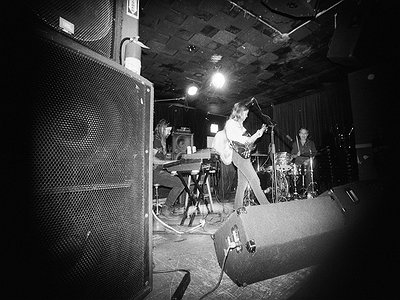Name: Doom Flower
Members: Jess Price (guitar/vocals), Bobby Burg (bass), Matt Lemke (synths), Areif Sless-Kitain (drums)
Occupation: Songwriters, instrumentalists
Nationality: American
Recent release: Doom Flower's "Loess Hills" is out now via Record Label. It is the second single off their forthcoming full-length Limestone Ritual.
If you enjoyed this interview with Doom Flower and would like to find out more about the band, visit their official website. They are also on Instagram, and Soundcloud.
For you to get started, do there need to be concrete ideas – or what some have called a 'visualisation' of the finished work? What does the balance between planning and chance look like for you?
“Loess Hills” was written with the visual of riding a horse and shooting a gun in the air.
Planning and chance are always in harmony and the ideas never feel concrete. The songs continue to evolve even after recording.
Is there a preparation phase for your process? Do you require your tools to be laid out in a particular way, for example, do you need to do 'research' or create 'early versions'?
Yes, almost all the songs started off as demos recorded at home and emailed back and forth. There are usually several versions of the songs.
I like to feel like a citizen scientist and love to feel flush with tools!
Do you have certain rituals to get you into the right mindset for creating? What role do certain foods or stimulants like coffee, lighting, scents, exercise or reading poetry play?
Our practice place’s door is next to a dog boarding facility, so there is a need to watch your step while loading gear or walking to the door. If someone accidently tracks waste in, those of us who aren’t gagging in the bathroom (Bobby) work together to clean it up and burn palo santo.
What do you start with? How difficult is that first line of text, the first note?
Jess: I have plenty of first lines and fewer finished songs. : )
Taking notes is daily passive writing. Melodies come up first and I record them quickly and look through the notes for lines that match the vowel sound and a song idea forms from that. Then I try to get a clear recording for Bobby to write to, from home.
His bass lines really pull it together and give it a mood and I’m able to finish writing more fluidly after that.
What makes lyrics good in your opinion? What are your own ambitions and challenges in this regard?
Usually what feels like a mash up of storytelling and lists.
Many writers have claimed that as soon as they enter into the process, certain aspects of the narrative are out of their hands. Do you like to keep strict control over the process or is there a sense of following things where they lead you?
It’s a balancing act of control and intentionally using out of control elements to spice things up.
Often, while writing, new ideas and alternative roads will open themselves up, pulling and pushing the creator in a different direction. Does this happen to you, too, and how do you deal with it? What do you do with these ideas?
We have a plan to record multiple vibe versions of our next record and piece it back together kind of like a mixtape. Then choosing the best version of each song for the collection.
There are many descriptions of the creative state. How would you describe it for you personally? Is there an element of spirituality to what you do?
Doom Flower tries to open ourselves up to follow our collective ideas into unexpected places that we could only go to with our unique blend.
Especially in the digital age, the writing and production process tends towards the infinite. What marks the end of the process? How do you finish a work?
We set deadlines for the albums to be finished. It doesn’t mean the songs are done and memorialized. It’s nice to have a fixed timeline when the creation itself is not fixed.
The deadline for our third album is the day Limestone Ritual comes out.
Once a piece is finished, how important is it for you to let it lie and evaluate it later on? How much improvement and refinement do you personally allow until you're satisfied with a piece? What does this process look like in practise?
We need to make it personally listenable 10 hrs in a row.
What's your take on the role and importance of production, including mixing and mastering for you personally? How involved do you get in this?
Mixing is really important to us because there is a specific guitar/bass ratio that compliments the writing.
When Neil Strauch mixed the first record, we went through several passes to get there–which made mixing Limestone Ritual a breeze because he knew what we were going for and improved upon it with his sensibilities.
After finishing a piece or album and releasing something into the world, there can be a sense of emptiness. Can you relate to this – and how do you return to the state of creativity after experiencing it?
We counteract that feeling by setting a deadline. This is why we set the deadline for the next recording on the release day of Limestone Ritual.




